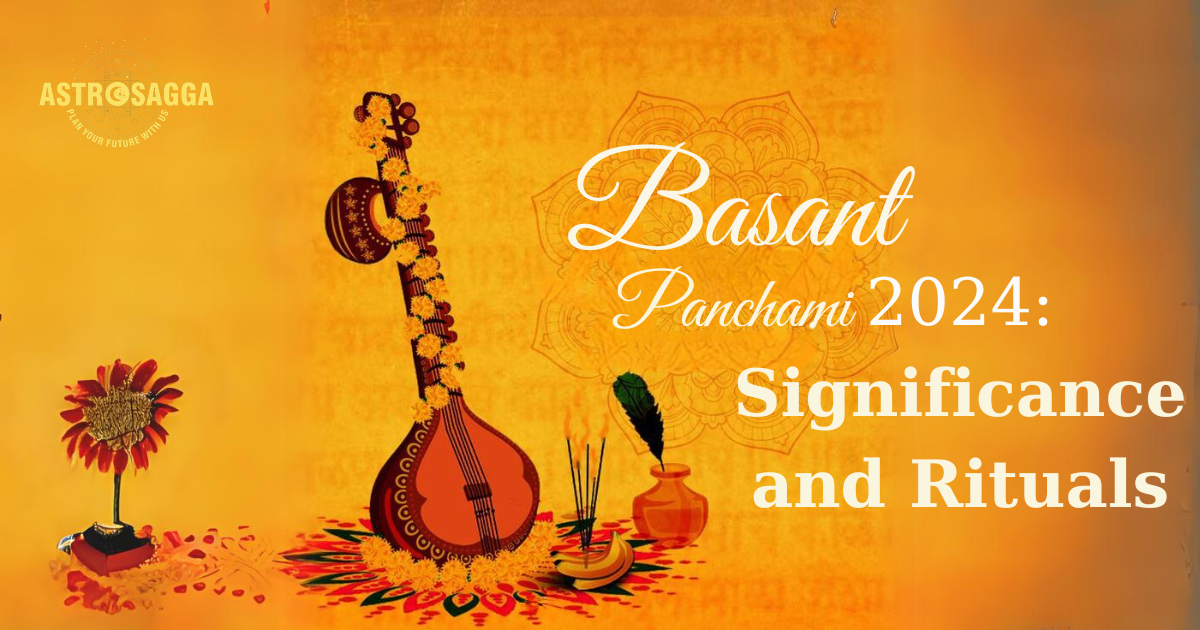Basant Panchami, a festival celebrated in various parts of India, holds profound cultural and religious significance. Also known as Saraswati Puja, it marks the arrival of spring, which is considered the season of hope, renewal, and growth. This festival, observed on the fifth day of the Hindu month of Magha, typically falls in late January or early February. Basant Panchami is not just about welcoming the change in seasons but also about honoring knowledge, wisdom, and the arts.
Historical Significance
Vedic Roots
The roots of Basant Panchami can be traced back to ancient Vedic literature, where it was celebrated as a festival dedicated to nature and the agricultural cycle. The transition from winter to spring was marked with rituals and offerings to invoke the blessings of deities for a bountiful harvest.
Association with Goddess Saraswati
Over time, Basant Panchami became closely associated with Goddess Saraswati, the embodiment of knowledge, wisdom, and creativity in Hindu mythology. Devotees believe that worshipping Saraswati on this day can bestow them with intellect, eloquence, and artistic talent.
Observance of Basant Panchami
Date and Timing
Basant Panchami is celebrated during the bright half of the lunar month of Magha, usually in late January or early February. It is believed that this day holds special significance due to its alignment with celestial events and astrological configurations.
Rituals and Traditions
On Basant Panchami, devotees wake up early, take a bath, and wear yellow-colored clothes, symbolizing the vibrancy of spring and the blossoming mustard flowers. They offer prayers to Goddess Saraswati, seeking her blessings by placing books, pens, musical instruments, and other tools of learning at her altar.
Celebrations Across India
Regional Variations
The festival of Basant Panchami is celebrated with great fervor and enthusiasm across India, albeit with regional variations in customs and traditions. In Punjab, it is marked with kite-flying competitions, while in West Bengal, it is a grand affair with elaborate rituals and cultural programs.
Festive Atmosphere
The air resonates with the sounds of hymns and chants dedicated to Goddess Saraswati. Homes, temples, and educational institutions are adorned with flowers, mango leaves, and intricate rangoli designs. Sweets and delicacies, prepared especially for the occasion, are shared with family and friends.
Spiritual Significance
Invoke Blessings
Basant Panchami is considered an auspicious day to commence new ventures, particularly in the field of education and creative arts. Students seek the blessings of Goddess Saraswati for success in their academic pursuits, while artists and musicians pray for inspiration and skill.
Cultural Rejuvenation
The festival of Basant Panchami rejuvenates cultural and artistic traditions, fostering a sense of pride in India's rich heritage. It serves as a reminder of the importance of knowledge, creativity, and cultural expression in society.
Basant Panchami and Education
Initiation of Learning
Many educational institutions organize special ceremonies and events to mark Basant Panchami. Students pay homage to their books and seek the blessings of their teachers for a fruitful academic year ahead.
Special Events in Schools and Colleges
From poetry recitations to art exhibitions, schools and colleges buzz with creative energy during Basant Panchami. It is a time for students to showcase their talents and skills, fostering a spirit of healthy competition and camaraderie.
Artistic Expression
Impact on Arts and Culture
Basant Panchami inspires artists, musicians, dancers, and writers to express themselves through various art forms. It is a time for cultural enthusiasts to come together, celebrate creativity, and promote the rich cultural heritage of India.
Folk Performances
Across India, folk performances such as Basant Utsav in West Bengal and Basant Raag in Rajasthan add to the festive fervor. These colorful and vibrant performances depict the joy of spring and the spirit of new beginnings.
Traditional Cuisine
Sweets and Savories
No Indian festival is complete without indulging in delicious treats. Basant Panchami is synonymous with mouth-watering sweets like kesari bhaat, malpua, and ladoos, which are prepared and shared with loved ones.
Sharing Happiness
Food plays a significant role in fostering bonds and spreading happiness during Basant Panchami. Families and friends gather to enjoy festive meals, exchange gifts, and celebrate the joyous occasion together.
Environmental Awareness
Emphasis on Nature
As Basant Panchami heralds the arrival of spring, it also serves as a reminder of our interconnectedness with nature. Many communities organize tree-planting drives and promote environmental conservation initiatives as part of the festivities.
Planting Trees
Planting trees on Basant Panchami is considered auspicious, symbolizing the renewal of life and the promise of a greener future. It is a gesture of reverence towards nature and a commitment to preserving the environment for future generations.
Global Observance
Basant Panchami Around the World
While Basant Panchami is primarily celebrated in India, its significance has transcended geographical boundaries. Indian diaspora communities around the world come together to observe the festival, keeping alive their cultural heritage and traditions.
Integration with Local Customs
In countries like Nepal, Pakistan, and Bangladesh, Basant Panchami is celebrated with rituals and customs adapted to local cultures. Despite the geographical distance, the festival fosters a sense of unity and belonging among people of Indian origin worldwide.
Basant Panchami in Modern Context
Social Media Trends
In the digital age, Basant Panchami celebrations have extended to social media platforms, where people share festive greetings, artwork, and inspirational quotes. It provides an opportunity for individuals to connect with their peers and spread joy and positivity.
Virtual Celebrations
With the advent of virtual communication tools, people can participate in Basant Panchami festivities from anywhere in the world. Online events, webinars, and virtual concerts allow individuals to celebrate the festival together, albeit virtually, fostering a sense of community and togetherness.
Significance in Astrology
Alignment with Celestial Events
Astrologically, Basant Panchami is considered an auspicious day due to its alignment with celestial events and planetary configurations. It is believed to be a favorable time for initiating new ventures, seeking blessings, and embarking on spiritual journeys.
Favorable Time for New Beginnings
Many people use Basant Panchami as an opportunity to set new goals, make resolutions, and embark on fresh beginnings in various aspects of their lives. It is seen as a propitious time for starting new projects, learning new skills, and seeking personal and professional growth.
In conclusion, Basant Panchami symbolizes the arrival of spring and the celebration of knowledge and culture. From ancient Vedic traditions to modern-day festivities, it fosters a sense of renewal and unity among communities. Honoring Goddess Saraswati highlights the importance of education and creativity in society. As we embrace Basant Panchami, let us cherish the values of harmony, learning, and environmental consciousness it represents. May this auspicious occasion inspire us to embark on new beginnings and contribute positively to our world.












